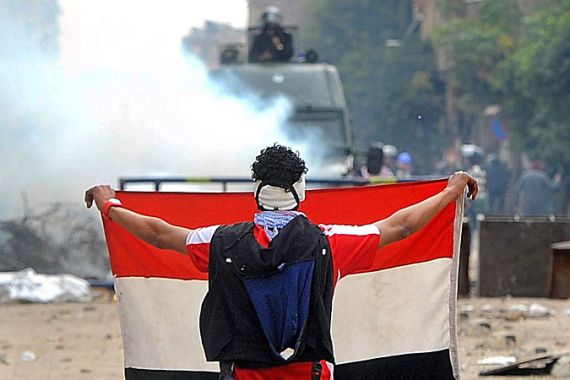
Are NGOs fanning unrest in Egypt?
As rights groups come under scrutiny over foreign funding, we ask if the ruling military is hunting for a scapegoat.
Relations between Egypt’s military rulers and the US government have hit a distinctly rocky patch.
|
“The rule of law should prevail in any country. No one organisation that’s working in the international arena should work in any country without a prior permit. If the raids are politically-motivated, why is the judiciary involved? There is a permit to start the organisation and another to receive foreign funds. The [military council] is trying to hold things together against a chaotic situation. The council wants to make sure that all those organisations are regulated and [comply with] the laws of Egypt.” – Maged Reda Botros, a political science professor |
Nineteen Americans are among 43 workers from non-government organisations (NGOs) who have been sent for trial in an Egyptian criminal court over charges of illegally using foreign funds to encourage unrest in the country.
Putting the issue firmly in the US media spotlight, Ray LaHood, the son of the US secretary of transportation, is among the 19 Americans who it is believed will have to face charges.
Sam LaHood heads the Egyptian office of the International Republican Institute, and was among several foreign workers banned from leaving Egypt just over a week ago, after their offices were raided by armed police.
The move prompted harsh criticism and even threats that Washington would review US aid to Egypt.
The announcement came on the fourth day of violent street protests in the country, amid anger at the authorities’ perceived inability to prevent a riot that left 74 people dead at a football match last week.
Egypt’s ruling military council has vowed to investigate how pro-democracy and human rights organisations are funded, and has repeatedly said it will not tolerate foreign interference in the country’s affairs.
|
“No one is against Egypt’s sovereignty, no one is against transparency. The said law grants extreme authority to the [government in dealing with NGOs]. Dozens of NGOs have been trying repeatedly to take a permit but the ministry of social solidarity does not even provide a response. This campaign since the beginning has included the names of almost all the independent human rights organisations, including the Egyptian ones.” – Sohair Riad, a human rights specialist |
The funding of NGOs has been a controversial issue for months.
Some observers believe the country’s military rulers are trying to blame recent unrest and violence on a foreign conspiracy.
On Saturday, a day before Egypt’s decision to put those 43 people on trial, Hillary Clinton, the US secretary of state, warned her Egyptian counterpart that the dispute may lead to the loss of much of the US’ annual aid to Cairo.
Most of that aid goes to the Egyptian military, according to the US congressional research service report.
Over the last 30 years, Egypt has been the second largest recipient of US foreign aid after Israel. In 2010 and 2011, $1.3bn went to strengthen Egyptian forces.
So, do the Egyptian military rulers genuinely believe that NGOs are destabilising Egypt, or are they looking for a scapegoat to take responsibility for the current instability? Is there a political motive behind it all?
Inside Story, with presenter James Bays, discusses with guests: Sohair Riad, a human rights activist with the Cairo Institute for Human Rights Studies; Sarah Topol, a Cairo-based journalist; and Maged Reda Botros, the chairman of the Political Science Department at Helwan University.
|
“It seems that the continued escalation of the raid leaves the Americans no choice. People I’ve spoken to in Washington say there is no way Hillary Clinton can certify genuinely that Egypt is abiding by the stipulation set out by the conditionality of aid. The continued crackdown on civil society here makes it somewhat impossible to do anything except to use the national security waiver that Clinton is allowed to use to let the aid go through, but that seems like it would cause an intense backlash on Capitol Hill.” Sarah Topol, a Cairo-based journalist |